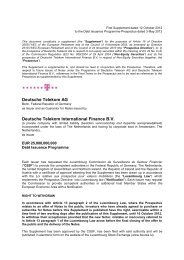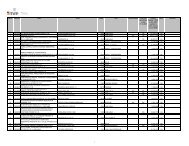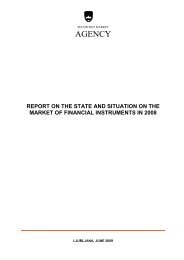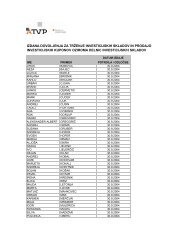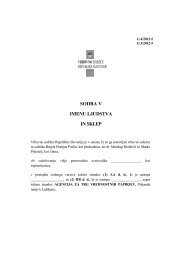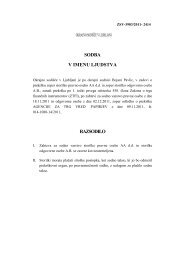In 2010, revenue remained stable as the effects of the first full-year consolidation of OTE offset arevenue decline in the fixed-network and mobile businesses. This revenue decline from line losses inthe traditional fixed-network business were almost fully offset by a positive trend in wholesale andbroadband revenues. In mobile communications, the reduced termination charges and intense pricecompetition affected negatively on service revenues. In addition, the prepay registration requirementsagain resulted in a loss of customers in the prepay segment, and consequently in lower revenue. Theslight increase in sales of terminal equipment in 2010 mitigated the revenue decline.Hungary. Around 72% of the revenue decrease in Hungary in 2011 can be attributed to thereclassification of business customers to T-Systems, which accounted for a revenue decrease ofapproximately EUR 38 million, and negative exchange rate effects from the performance of theHungarian forint against the euro. Higher broadband/TV revenue only partially offset the revenuelosses in Deutsche Telekom's traditional fixed-network business. The decrease in mobile servicerevenues was primarily due to the reclassification of business customers. In addition, revenue fromvoice telephony and text messaging declined as a result of competition-induced price cuts anddecreased use of voice telephony per customer, but was partially offset by slightly higher revenuefrom the sale of terminal equipment devices.In 2010, the revenue decline was primarily a result of the special tax imposed by the Hungariangovernment in October 2010, which reduced revenue by EUR 0.1 billion. The decline in revenue fromoperations was largely attributable to the general economic situation. The fixed-network business wasaffected to a greater extent than mobile communications, despite growth in broadband/TV lines andthe resulting increase in revenue. Service revenues from mobile operations decreased mainly as aresult of reduced mobile termination charges. This decline was partially offset by the positiveexchange rate effect from the translation of the Hungarian forint to euros and increases in non-voicemobile revenues.Poland. The revenue decline in Poland in 2011 was primarily caused by negative exchange rateeffects due to the performance of the Polish zloty against the euro. In addition, service revenuesdeclined as a result of intense competition, but were offset by significantly higher data revenues.Deutsche Telekom was able to increase revenue from the sale of terminal equipment by successfullymarketing smartphones, which had a positive impact on total revenue.In 2010, positive exchange rate effects from the translation of the Polish zloty to euros increasedrevenue at PTC, compensating for the decline in revenue from operations attributable primarily toservice revenues. Higher levels of non-voice revenues only partially compensated the revenue lossesin voice telephony. The revenue losses in voice telephony were primarily the result of a decrease inaverage per-minute calling rates.The Netherlands. The decrease in revenue in 2011 mainly resulted from the adverse effects ofmultiple cuts in termination rates by the Dutch regulatory authority, which resulted in lower servicerevenues. This decline was partially offset by a significant increase in Deutsche Telekom's datarevenues and by higher proceeds from terminal equipment sales, due to a high demand forsmartphones. The development of the fixed-network business was more or less stable compared to2010.In 2010, T-Mobile Netherlands reported a slight decrease in revenue, due mainly to lower MVNO andonline revenues as well as and price decreases resulting from increased regulation. This was partiallyoffset by higher service revenues, including higher non-voice revenues. The increase in the contractcustomer share of the total customer base also had a positive impact on revenue.- Adjusted EBITDAIn 2011, over one third of the decrease in adjusted EBITDA in Deutsche Telekom's Europe operatingsegment was attributable to the deconsolidation of T-Mobile UK effective 1 April 2010. In addition, thereal estate tax introduced by the Greek government in 2011 had an adverse effect on adjustedEBITDA. Added to this were slightly negative overall exchange rate effects, with the positiveperformance of the Czech koruna only partially offsetting the negative performance of the Polish zloty,the Croatian kuna, and the Hungarian forint against the euro. The decline in adjusted EBITDA isprimarily attributable to the lower revenue in 2011 compared with 2010. Deutsche Telekom partiallyoffsets this negative trend by reducing overhead costs, particularly in Greece and Hungary.90
The decrease in adjusted EBITDA in 2010 was primarily due to the offsetting effects that affectedrevenue. Adjusted EBITDA declined as a result of the deconsolidation of T-Mobile UK effective1 April 2010 and the newly imposed special tax in Hungary that applied retroactively to the entire 2010financial year. Adjusted EBITDA was positively affected by the first full-year consolidation of OTE.Positive exchange rate effects attributable primarily to the translation from Polish zlotys, Czechkorunas, Hungarian forints, Croatian kunas and pounds sterling also had a positive effect.For 2012, Deutsche Telekom expects adjusted EBITDA in the Europe operating segment to decline.Adjusted EBITDA may be adversely affected by changes in legislation, for instance in connection withgovernment austerity programs. The special tax in Hungary, for instance, will impact adjusted EBITDAnegatively in 2012 by leading to lower revenues. The same is true for Greece, which introduced a realestate tax in 2011, as well as for Croatia, which reintroduced a mobile communications tax on 26January 2012. Exchange rate effects could also adversely affect adjusted EBITDA on a euro basis.Deutsche Telekom intends to continue to increase productivity by cutting costs, which will entailheadcount reductions in some of the countries in this segment.Adjusted EBITDA in the main countries of Deutsche Telekom's Europe operating segment developedas described below.Greece. The decrease in adjusted EBITDA in 2011 was due to lower revenues and decisions bypublic authorities. In September 2011, the Greek government introduced a real estate tax for 2011. Inaddition, regulated rates were retroactively adjusted in the second quarter of 2011. DeutscheTelekom's programs and initiatives to increase efficiency, particularly in lower personnel costs,partially offset the decline in adjusted EBITDA.Adjusted EBITDA remained almost stable in 2010 in the Greek mobile and fixed-network operations,due in particular to the positive effect from the first full-year consolidation of OTE and lower expensesrelated to overhead. This increase was partially offset by the negative revenue trend and highercustomer acquisition costs resulted from intense mobile competition.Hungary. In 2011, similar to the development of revenue, approximately 73% of the decrease inadjusted EBITDA was due to the reclassification of business customers and the unfavorable exchangerate performance of the Hungarian forint against the euro. Savings in overhead costs largely offset thenegative effects of the decline in revenue from operations.The decline in adjusted EBITDA in 2010 was primarily a result of the tax imposed by the HungarianGovernment described above. However, positive exchange rate effects from the translation of theHungarian forint to euros mitigated this decline. Adjusted EBITDA from mobile operations increasedslightly.Poland. The decline in adjusted EBITDA in 2011 was primarily attributable to sales and customerservice costs for rebranding Era to T-Mobile in June 2011 as well as negative exchange rate effects.Improving the way Deutsche Telekom address servings its high-value contract customers had apositive effect on EBITDA, which partially offset the negative effects of revenue decreases andrebranding costs.In 2010, adjusted EBITDA increased due primarily to positive exchange rate effects. In addition, lowercustomer retention costs and savings on overhead, especially in technology and marketing, helpedcompensate for the negative effects of the revenue decline. A positive effect recorded in the fourthquarter of 2010 contributed further to the increase in adjusted EBITDA.The Netherlands. The increase in adjusted EBITDA in 2011 resulted primarily from savings incustomer acquisition and overhead costs, which offset the negative revenue effects from regulation.In 2010, T-Mobile Netherlands increased adjusted EBITDA, primarily as a result of lower customeracquisition costs and an effect in the second quarter of 2010. Growth in adjusted EBITDA was due tosignificant savings in overhead costs, following the completed integration of Orange.- Profit from OperationsThe decrease in profit from operations in 2011 in Deutsche Telekom's Europe operating segment wasdue to the decrease in adjusted EBITDA described above and the higher overall depreciation,amortisation and impairment losses at the segment level. Impairment losses on goodwill and property,plant and equipment totaled EUR 1.0 billion in 2011, compared to EUR 0.7 billion recorded in 2010.Impairment losses on goodwill in 2011 were mainly recognised in the cash-generating units of Greece91
- Page 1 and 2:
Debt Issuance Programme ProspectusD
- Page 3 and 4:
Responsibility StatementDeutsche Te
- Page 5 and 6:
to form and content, and all rights
- Page 7 and 8:
Maturities:Form of Notes:Fixed Rate
- Page 10 and 11:
Summary in respect of Risk FactorsR
- Page 12 and 13:
Notes may not be a suitable investm
- Page 14 and 15:
Internationalisation and Sustainabi
- Page 16 and 17:
German Translation of the SummaryDi
- Page 19 and 20:
Besteuerung:Vorzeitige Rückzahlung
- Page 21 and 22:
Zusammenfassung der RisikofaktorenZ
- Page 23 and 24:
Zusammenfassung der Risikofaktoren
- Page 25 and 26:
Unternehmen aus diesem Grund zusamm
- Page 27 and 28:
Risk FactorsProspective investors s
- Page 29 and 30:
markets. These developments could,
- Page 31 and 32:
consumer regulation at the federal
- Page 33 and 34:
Existing mobile substitution effect
- Page 35 and 36:
exacerbated by the global economic
- Page 37 and 38:
are subject to several individual l
- Page 39 and 40: While Deutsche Telekom believes tha
- Page 41 and 42: exposed to the risk of an unfavoura
- Page 43 and 44: principal under such Notes may even
- Page 45 and 46: Statement of cash flows (page 9 in
- Page 47 and 48: otherwise agreed between the Issuer
- Page 49 and 50: DESCRIPTION OF BUSINESSGroup Organi
- Page 51 and 52: In February 2011, T-Mobile Czech Re
- Page 53 and 54: 2010. The demand for ever-faster da
- Page 55 and 56: Special Requirements Applicable to
- Page 57 and 58: Local Loop AccessDeutsche Telekom h
- Page 59 and 60: Incumbent network operators are obl
- Page 61 and 62: (e.g., avoid disclosure or blocking
- Page 63 and 64: PTC as Deutsche Telekom clarified t
- Page 65 and 66: combinations of businesses where De
- Page 67 and 68: For more information on the effects
- Page 69 and 70: • Other operating expenses increa
- Page 71 and 72: 345Includes expense relating to a c
- Page 73 and 74: investment levels to remain approxi
- Page 75 and 76: products and technologies, these in
- Page 77 and 78: Reconciliation of Net Debt31 Dec. 2
- Page 79 and 80: Deutsche Telekom's cash outflows fo
- Page 81 and 82: 1In addition to the fixed-network l
- Page 83 and 84: Development of Operations2011 2010
- Page 85 and 86: to upgrade its mobile network, prov
- Page 87 and 88: Czech Republic. Deutsche Telekom ha
- Page 89: decrease mobile termination rates,
- Page 93 and 94: In 2011, the United States operatin
- Page 95 and 96: The increase in total revenue in 20
- Page 97 and 98: solutions. It also manages and deve
- Page 99 and 100: In 2010, T-Systems substantially ex
- Page 101 and 102: 2011 2010 Change ChangeOf which: Vi
- Page 103 and 104: conditions for additional capital m
- Page 105 and 106: For additional information on the c
- Page 107 and 108: Employees in the Group 31 Dec. 2011
- Page 109 and 110: Civil servants employed by Deutsche
- Page 111 and 112: Selected Financial InformationDeuts
- Page 113 and 114: (Vorlagebeschluesse) with respect t
- Page 115 and 116: Court of Justice annulled these jud
- Page 117 and 118: having to pay license fees and comp
- Page 119 and 120: Civil ServantsIn November 2004, Ger
- Page 121 and 122: majority holdings by 2 May 2015, on
- Page 123 and 124: Group Accounting manages the proces
- Page 125 and 126: Deutsche Telekom International Fina
- Page 127 and 128: Statement of comprehensive incometh
- Page 129 and 130: Terms and ConditionsThis Series of
- Page 131 and 132: "Global Note" means [the/any] [Temp
- Page 133 and 134: interest shall continue to accrue o
- Page 135 and 136: 7 February 1992), the Amsterdam Tre
- Page 137 and 138: Period is a day other than the 30th
- Page 139 and 140: [in the case of Definitive Notes in
- Page 141 and 142:
([4]) of this § 6.](b)Notice of re
- Page 143 and 144:
of Stock Exchange], a Paying Agent
- Page 145 and 146:
(f)(g)the Issuer [in the case of No
- Page 147 and 148:
§ 14[(5)] to the Agent. Such notic
- Page 149 and 150:
Garantin] noch der Fiscal Agent ode
- Page 151 and 152:
Bei Rückzahlung oder Zahlung einer
- Page 153 and 154:
(b)Fällt ein Zinszahlungstag auf e
- Page 155 and 156:
[Sofern eine andere Methode der Bes
- Page 157 and 158:
[im Falle von Actual/360: die tats
- Page 159 and 160:
Für diese Zwecke bezeichnet "Zahlt
- Page 161 and 162:
Eine solche Kündigung darf allerdi
- Page 163 and 164:
(i)[Referenz-Preis einfügen] (der
- Page 165 and 166:
[(e)(f)von einer Zahlstelle abgezog
- Page 167 and 168:
(b)(c)(d)die Nachfolgeschuldnerin a
- Page 169 and 170:
eine vertretungsberechtigte Person
- Page 171 and 172:
(d)(e)(f)(iii)(iv)(v)(vi)by reason
- Page 173 and 174:
Non-binding translation of the Guar
- Page 175 and 176:
ganz oder teilweise in irgendeiner
- Page 177 and 178:
Tag der Begebung: [ ]These are the
- Page 179 and 180:
CURRENCY, DENOMINATION, FORM AND TI
- Page 181 and 182:
INTEREST (§ 4) 8ZINSEN (§ 4)o Fix
- Page 183 and 184:
oooooo ISDA Determination 9ISDA-Fes
- Page 185 and 186:
Instalment Amount(s)Rate(n) [ ]Earl
- Page 187 and 188:
GOVERNING LAW (§ 14)ANWENDBARES RE
- Page 189 and 190:
German Securities Code [ ]Deutsche
- Page 191 and 192:
Umfassende Erläuterung darüber, w
- Page 193 and 194:
Various categories of potential inv
- Page 195 and 196:
Commissions 29ProvisionenManagement
- Page 197 and 198:
Die Emittentin hat die Informatione
- Page 199 and 200:
Payment of the flat income tax will
- Page 201 and 202:
Kingdom of the Netherlands.Where th
- Page 203 and 204:
ResidentsAccording to the law of 23
- Page 205 and 206:
(c)account or benefit of, U.S. pers
- Page 207 and 208:
4. United KingdomEach Dealer has re
- Page 209 and 210:
Names and AdressesIssuersDeutsche T
- Page 211:
2010 2010PricewaterhouseCoopers Akt




